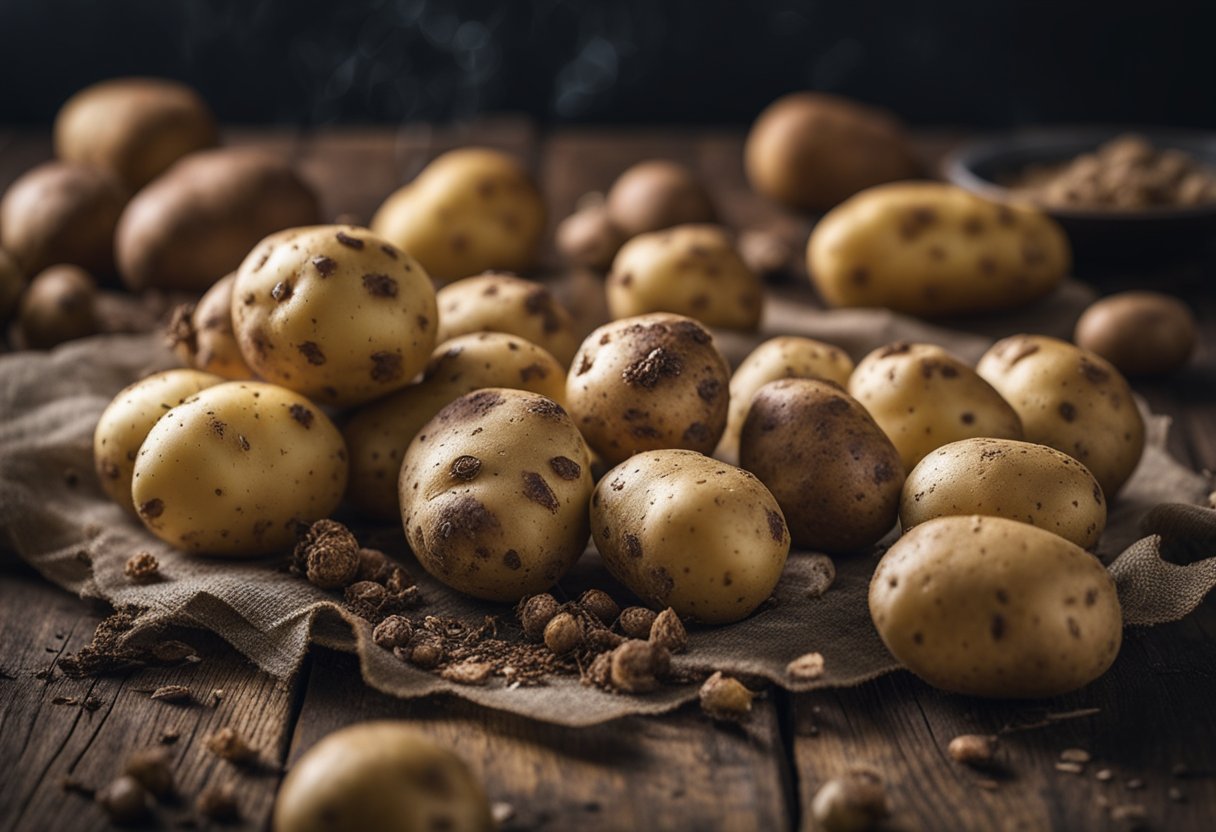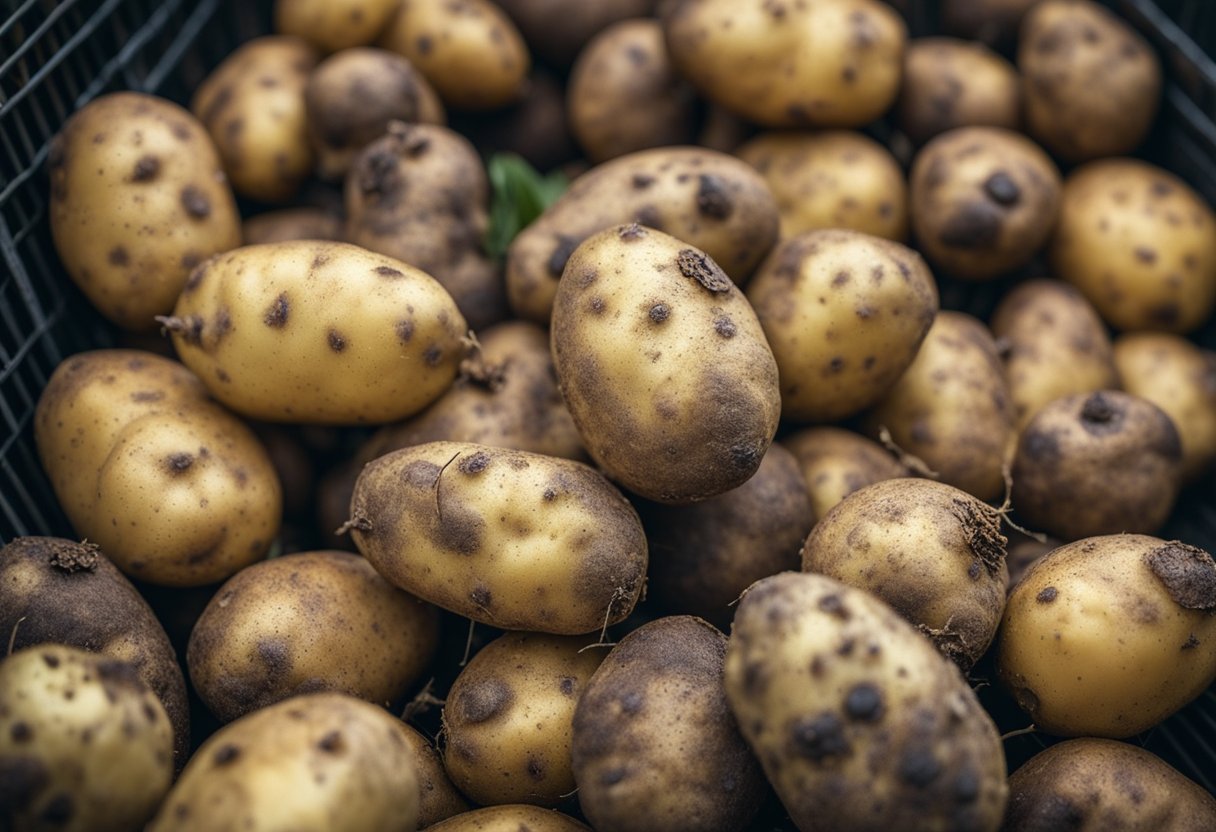As an Amazon Associate I earn from qualifying purchases.
At A Glance
Yes, you can compost rotten tomatoes. Rotten tomatoes are organic material and will decompose easily in a compost pile, contributing to the nutrient richness of the compost. They are considered “green” compost material, providing necessary nitrogen for the composting process. It’s advisable to bury the rotten tomatoes in the compost pile or mix them well with “brown” materials like dry leaves, twigs, or shredded newspaper to help balance the compost pile and prevent attracting pests.
Composting is a great way to reduce waste and create nutrient-rich soil for your garden. But what about rotten potatoes? Can you compost them? The answer is yes, you can compost rotten potatoes, but there are some things to keep in mind to ensure your compost remains healthy.
Rotten potatoes are a natural material that decomposes, making them a great addition to your compost bin. However, it’s important to note that potatoes can carry diseases, such as blight, that can transfer to your compost. To avoid this, it’s recommended that you only add healthy potatoes and peels to your compost. Additionally, if you notice any signs of disease, such as sprouts or brown spots, it’s best to throw them away instead of adding them to your compost.
Can You Compost Rotten Potatoes?

As an avid gardener and composter, I often get asked whether it’s okay to compost rotten potatoes. The answer is yes, you can compost rotten potatoes. In fact, composting is an excellent way to dispose of your rotten potatoes and other organic matter.
Composting is the process of breaking down organic matter into a nutrient-rich soil amendment that can be used to fertilize plants. It’s an eco-friendly way to dispose of your kitchen scraps and yard waste while also benefiting your garden.
Rotten potatoes are a natural material that decomposes quickly and easily, making them an ideal addition to your compost pile. However, if you’re composting potato peels or scraps, it’s important to remember that they can take longer to break down than whole potatoes. To speed up the process, chop them into smaller pieces before adding them to your compost pile.
It’s also important to note that if you’re composting a large quantity of potatoes, you may notice an unpleasant odor as they decompose. To avoid this, it’s best to bury them deep within your compost pile and cover them with a layer of other organic matter.
In addition to composting rotten potatoes, you can also use compost to grow new potatoes. Composting potatoes is a great way to create a nutrient-rich growing medium that will help your plants thrive. To compost potatoes, simply mix them in with your other organic matter and let them decompose naturally.
Overall, composting is an excellent way to dispose of your rotten potatoes and other organic matter while also benefiting your garden. By following a few simple steps, you can turn your kitchen scraps and yard waste into a nutrient-rich soil amendment that will help your plants grow strong and healthy.
The Science Behind Composting
Decomposition Process
Composting is a natural process that breaks down organic matter into a nutrient-rich soil-like substance called compost. The decomposition process is carried out by microorganisms such as bacteria, fungi, and other decomposers. These microorganisms feed on the organic matter and break it down into simpler compounds. During the process, heat is generated, which helps to kill off any pathogens and weed seeds that may be present in the organic matter.
Role of Nitrogen and Carbon
Nitrogen and carbon are two essential elements required for successful composting. Nitrogen is necessary for the growth and reproduction of microorganisms, while carbon provides energy for the microorganisms. A good balance of nitrogen and carbon is required for efficient composting. Green material such as grass clippings, vegetable scraps, and coffee grounds provide nitrogen, while brown material such as leaves, sawdust, and newspaper provide carbon.
Temperature and Moisture Levels
Temperature and moisture levels are critical factors in the composting process. The microorganisms responsible for decomposition are most active in a temperature range of 120-160°F (49-71°C). Moisture levels should be kept between 40-60% to ensure that the microorganisms have enough water to survive and thrive. If the pile is too dry, the microorganisms will become dormant, and the composting process will slow down. On the other hand, if the pile is too wet, it can become anaerobic, which means that there is not enough oxygen for the microorganisms to survive.
Composting Methods
There are several methods of composting, including active composting, hot composting, and vermicomposting. Active composting involves turning the compost pile regularly to ensure that oxygen is present throughout the pile. Hot composting involves creating a large pile of organic matter that generates enough heat to kill off pathogens and weed seeds. Vermicomposting involves using worms to break down organic matter into compost.
When composting potatoes, it is essential to ensure that they are cut into small pieces to speed up the decomposition process. Also, it is recommended to add other organic matter such as vegetable scraps, leaves, and grass clippings to the compost bin to provide a good balance of nitrogen and carbon.
Potential Risks and Solutions

Potato Blight and Other Diseases
One potential risk of composting rotten potatoes is the spread of potato blight and other diseases. Potato blight is a fungal disease that affects plants in the solanaceae family, including potatoes. The disease can spread rapidly and cause significant damage to crops. If you add diseased potatoes to your compost pile, you run the risk of introducing and spreading blight.
To avoid this risk, it’s best to avoid adding diseased potatoes to your compost. If you’re unsure whether a potato is diseased, it’s better to err on the side of caution and dispose of it in the trash. Additionally, if you do add potatoes to your compost pile, be sure to monitor the pile for signs of disease and remove any affected material.
Attracting Rodents and Other Pests
Another potential risk of composting rotten potatoes is the attraction of rodents and other pests. Potatoes are a food source for many animals, including rats, mice, and raccoons. If you add potatoes to your compost pile, you may attract these animals to your yard.
To avoid this risk, it’s best to bury the potatoes deep in the compost pile and cover them with other organic material. This will help to deter rodents and other pests from digging up the potatoes. Additionally, if you notice signs of rodent activity around your compost pile, you may want to consider using a rodent-proof compost bin or adding wire mesh to the bottom of your compost pile to prevent animals from burrowing into the pile.
Overall, composting rotten potatoes can be a great way to reduce waste and create nutrient-rich soil for your garden. However, it’s important to be aware of the potential risks and take steps to mitigate them. By following these tips, you can compost your potatoes safely and effectively.
Benefits of Composting Potatoes
Composting is a great way to recycle organic waste and turn it into nutrient-rich fertilizer for your garden. Potatoes are a great addition to your compost pile, as they are rich in nitrogen and carbon, two essential nutrients for healthy soil and plants.
When you compost potatoes, you are not only reducing the amount of waste that goes to the landfill, but you are also creating a natural fertilizer that can help promote healthy plant growth. The high nitrogen content in potatoes promotes new growth, while the presence of carbon aids in the decomposition process.
Composting potatoes can also help prevent the spread of disease in your garden. By properly composting potato scraps, you can ensure that any potential pathogens are destroyed before they can infect your plants.
In addition, composting potatoes can help you create a more sustainable garden. By recycling organic waste, you are reducing your reliance on synthetic fertilizers and promoting a healthier, more natural ecosystem.
Overall, composting potatoes is a great way to create healthy soil, healthy plants, and a healthier planet.
What Else Can You Compost?
When it comes to composting, there are plenty of materials that you can add to your compost bin or pile. Here are some of the most common materials that you can compost:
Vegetables and Fruits
Vegetables and fruits are excellent materials to add to your compost. They are rich in nutrients and will break down easily in your compost pile. Some examples of vegetables and fruits that you can compost include lettuce, celery, citrus, and more.
Garden and Household Waste
In addition to vegetables and fruits, you can also add garden and household waste to your compost pile. This can include grass clippings, leaves, and flowers. You can also add newspaper and cardboard, as long as they are shredded or torn into small pieces.
It’s important to note that while you can compost a wide variety of materials, there are some things that you should avoid adding to your compost pile. These include meat, dairy, and oily foods, as well as pet waste and diseased plants.
In addition, it’s important to maintain a balance of carbon-rich materials (such as newspaper and cardboard) and green materials (such as grass clippings and kitchen scraps) in your compost pile. This will help to ensure that your compost breaks down properly and doesn’t develop mold or attract rodents.
If you’re new to composting, you may also want to consider adding worms to your compost pile. Worms can help to break down your materials more quickly and efficiently, and can also help to aerate your compost pile.
Overall, composting is a great way to reduce waste and create nutrient-rich soil for your garden. With a little bit of effort and know-how, you can turn your kitchen scraps and yard waste into a valuable resource for your plants.
Conclusion
In conclusion, rotten potatoes can be safely added to your compost bin. Potatoes are a natural material that decomposes and can help create a nutrient-rich soil that is beneficial for plants. However, it is important to note that adding diseased potatoes to your compost pile can spread blight and other diseases, so it is best to avoid them.
When composting potatoes, it is recommended to cut them into smaller pieces to speed up the decomposition process. Additionally, it is important to balance the carbon-to-nitrogen ratio in your compost pile by adding other organic materials, such as green leaves or grass clippings.
Overall, composting is a great way to reduce waste and create a natural fertilizer for your garden. By following the proper guidelines, you can safely compost a variety of food scraps, including rotten potatoes.
